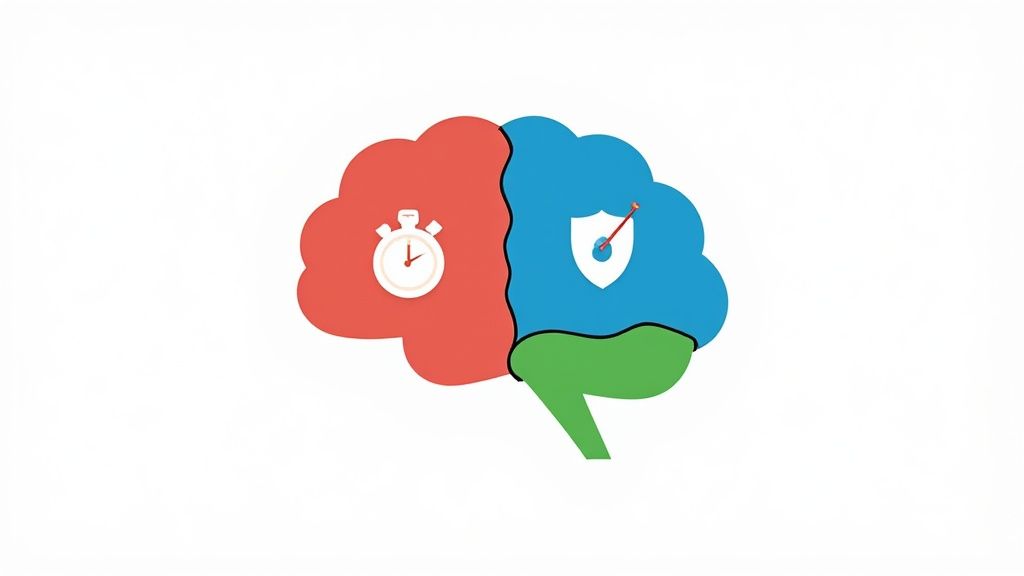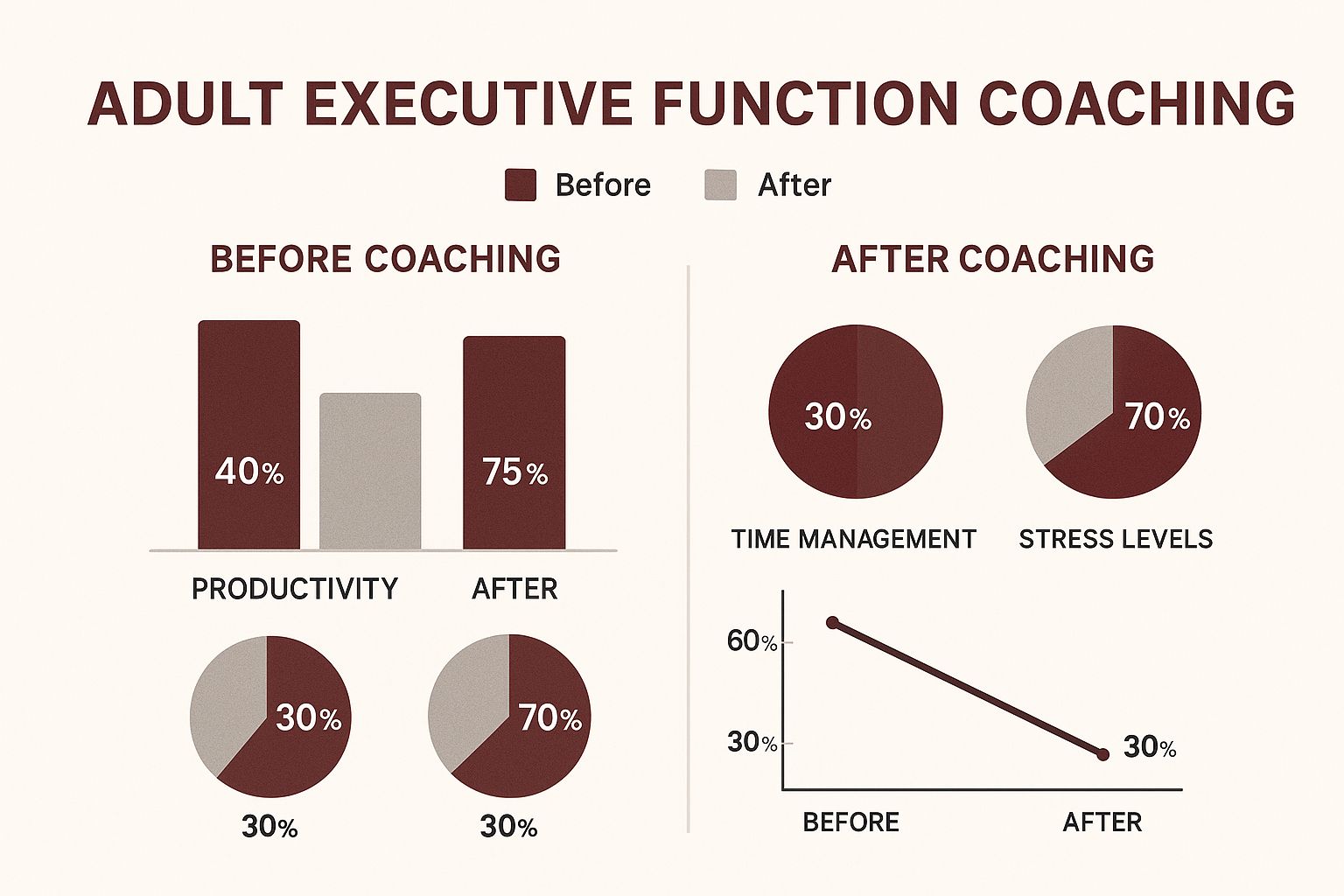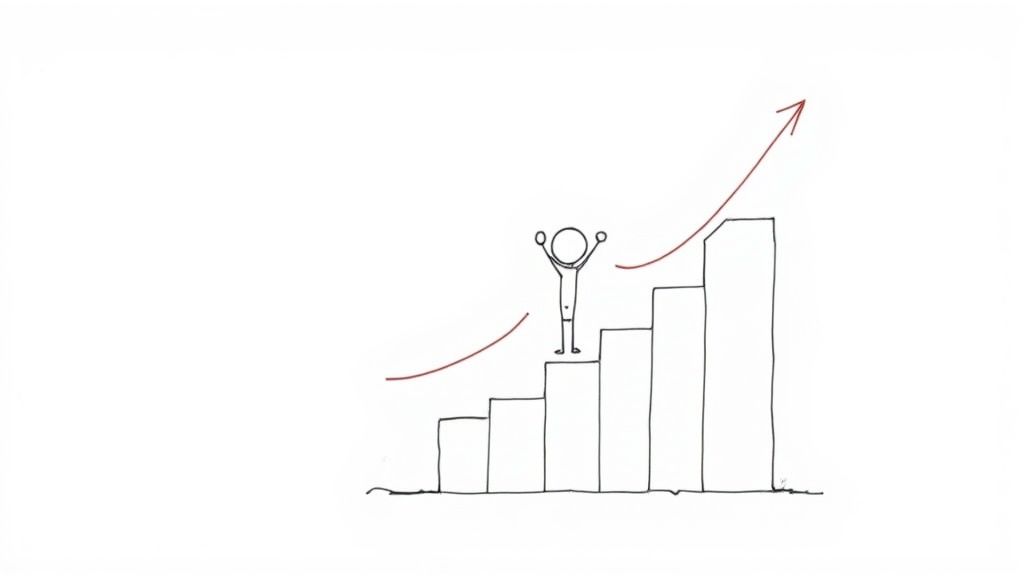Understanding Your Brain's CEO: What Executive Function Really Means
Imagine your brain is a company. Your executive function is the CEO, working hard to keep everything running smoothly. Forget those dry textbook definitions. Let's explore what executive function actually does in your daily life. Ever felt like you were juggling work projects, appointments, and suddenly your brain just…stopped? That's not laziness; that's your executive function system overloaded.
This "CEO" isn't one person, but a team of cognitive skills. Think of them as executive assistants, each with a critical role. One handles planning and prioritizing, another manages time, and another specializes in emotional regulation. When this team collaborates effectively, you navigate complex situations, make smart choices, and achieve goals.
But what happens when these functions are weak? Daily life can become a struggle. For example, someone might be a fantastic planner but terrible at switching gears. They might meticulously plan a project, but struggle when unexpected issues pop up. Someone else might focus intensely for hours, but have trouble starting tasks. They might be great at deep work, but find it almost impossible to begin.
This shows us that executive function isn't one skill, but a whole system. For many adults, some executive functions are strong, while others are weak. This creates unique strengths and challenges for each person.
Personalized Strategies for Your Brain
Understanding these individual patterns is key to effective executive function coaching for adults. Instead of generic productivity tips, coaching helps people pinpoint their specific cognitive strengths and weaknesses. This personalized approach lets adults develop strategies that work with their brains. Research on executive function coaching shows promising results, especially for productivity and mental health. A 2023 review found that adults who participated in coaching improved their executive function scores by 10–20%, particularly in areas like starting tasks, planning, and managing emotions. For more information, check out this article: What Is the Science Behind Executive Function 2023?. Often, typical productivity advice feels impossible to follow because it doesn't account for these differences. Learn more in this article about Executive Functioning and ADHD.
Ultimately, understanding your own cognitive patterns builds the foundation for real, lasting change. It’s about learning to work with your brain, not against it. This helps adults create systems that support their strengths and address their challenges, resulting in better focus, greater productivity, and improved well-being.
Why Generic Productivity Hacks Don't Work for Executive Function

You know the drill: you've bought the color-coded planner, downloaded the latest productivity apps, and maybe even designed your own intricate time management system. But that nagging feeling of being overwhelmed and scattered just won't go away. This is a common scenario for adults looking to boost their productivity. The problem is, most productivity advice assumes everyone's brain works the same way. And that’s just not true.
The Unique Challenges of Adult Executive Function
Adult executive function challenges aren't just about being organized. They're about how our brains process information and manage tasks. Think of your executive function as your brain's air traffic control system. It manages attention, juggles time, and keeps impulses in check.
When this system isn't working smoothly, it’s like a control tower struggling to keep up with incoming and outgoing flights. Delays, missed connections, and general chaos are inevitable, no matter how hard the individual controllers work.
For example, someone might be amazing at planning complex projects but struggle to switch gears when interrupted. Imagine trying to shift from deep work on a report to answering emails – the transition can be surprisingly difficult, leading to frustration and lower efficiency. Someone else might have incredible focus, able to work for hours on a single task, but struggle with task initiation. Just getting started, even on a small project, can feel like climbing a mountain.
Stress: The Executive Function Disruptor
And then there's stress. Adult life often comes with its own set of pressures – demanding careers, family responsibilities, and societal expectations. This stress can throw a wrench into our executive function. Studies show stress can reduce cognitive skills related to executive function by up to 30%. Coaching programs that incorporate mindfulness and movement can help mitigate these effects, improving executive function in adults. To dig deeper into the science behind this, take a look at this article: What Is the Science Behind Executive Function 2023?. It's a vicious cycle: the harder we try to be productive, the more stressed and frustrated we become, further hindering our executive function.
Shame and Societal Expectations
On top of everything else, there’s often shame associated with executive function challenges. In a culture that prizes productivity and organization, struggling with these skills can lead to feelings of inadequacy. Some adults with executive function challenges even turn to dietary supplements for focus and concentration for extra help. Societal expectations can amplify these feelings, making it even harder to seek help. This highlights the importance of executive function coaching for adults. This specialized field addresses the complex interplay between cognitive skills, emotional regulation, and real-world demands. Unlike generic productivity tips, coaching recognizes that brains work differently and need personalized strategies. It goes beyond surface-level solutions to address the underlying cognitive patterns driving these challenges.
Inside the Coaching Room: What Actually Happens in Sessions
Forget generic productivity tips. Think of executive function coaching for adults more like partnering with a detective to unravel the mysteries of your own mind. It begins with understanding how your brain operates. A skilled coach helps you map your unique cognitive patterns. Why, for example, do you feel energized and productive in the evenings but struggle to get going in the mornings? Or maybe you’re a master organizer of events, yet you constantly misplace your keys. This initial exploration forms the foundation for personalized strategies.
Collaborative Experiments and Personalized Strategies
Coaching sessions then evolve into a series of collaborative experiments. It's not about a coach dictating solutions; it's about working with your brain's natural tendencies. Imagine trying different approaches to starting your workday. A highly detailed schedule might work wonders for some, while others might thrive with a more flexible approach. Coaches use various tools and techniques to help you recognize your patterns and develop strategies that truly fit your life. Executive function coaching can even be a valuable resource for job seekers. Looking for work? Here’s a helpful guide on how to find a job.
To illustrate the potential impact of executive function coaching, take a look at the infographic below. It visually compares percentages before and after coaching across three key areas: productivity, time management, and stress levels, based on aggregated client data.
As the infographic shows, productivity jumps significantly from 40% to 75% after coaching. Time management also sees a major boost, improving from 30% to 70%. And perhaps most importantly, stress levels plummet from 60% down to 30%. This visual demonstrates the measurable improvements coaching can bring across multiple areas connected to executive function.
Beyond Checklists: Measuring Real Progress
Effective executive function coaching goes deeper than just practical skills. It delves into the emotional patterns that can often hold us back. Many people experience feelings of shame or frustration when grappling with executive function challenges. Coaching provides a safe and supportive space to explore these emotions and develop coping strategies. True progress isn't just about an organized desk; it's about reduced stress, stronger relationships, and increased confidence.
Real change is about feeling empowered to tackle challenges, not just checking off a to-do list. It's about building a sustainable system that supports your whole self. This holistic approach fosters lasting improvements in overall well-being, giving you the skills to navigate the complexities of daily life with greater ease and confidence.
To understand how executive function coaching differs from traditional approaches to productivity, let's look at a comparison table. This table outlines the core differences in methods, focus areas, and expected outcomes.
Executive Function Coaching vs. Traditional Approaches
| Approach | Focus Area | Method | Timeline | Outcome Measurement |
|---|---|---|---|---|
| Executive Function Coaching | Underlying cognitive processes and emotional regulation | Personalized strategies, collaborative experimentation, skill development | Ongoing, tailored to individual needs | Reduced stress, improved relationships, increased confidence, enhanced self-awareness |
| Traditional Productivity Training | Task management and efficiency | Standardized techniques, checklists, time management systems | Short-term, focused on immediate results | Number of tasks completed, time spent on tasks |
As you can see, executive function coaching takes a more personalized and holistic approach, focusing on the root causes of challenges rather than just surface-level solutions. While traditional productivity training can be helpful for short-term gains, executive function coaching aims for deeper, more sustainable changes.
Who's Turning to Executive Function Coaching and Why Now
The need for executive function coaching for adults is growing rapidly, and it's reaching people from all walks of life. Think of Sarah, a successful marketing director who thrived in a traditional office. The shift to remote work left her struggling to manage her time and prioritize tasks—a common experience for many.
Then there's Marcus, diagnosed with ADHD at 34. He always knew typical productivity advice didn't work for him. Now, with a diagnosis, executive function coaching offers strategies tailored to his specific needs. And consider Lisa, a parent juggling work, kids, and everything else life throws her way. She’s constantly overwhelmed, despite being highly capable. Executive function coaching is giving her practical tools to manage the chaos.
The Rise of Executive Function Coaching
These stories aren't isolated incidents. Remote work, while offering flexibility, has revealed executive function challenges that a structured office often masked. For many, the physical workplace provided a framework that supported weaker executive function skills. The shift to working from home brought these struggles to light. Greater awareness of neurodiversity also means more adults are recognizing their challenges and seeking solutions. Executive function coaching has become increasingly common for adults in the last ten years, particularly in major Western markets. In the U.S., surveys show that roughly 10% of adults with ADHD—about 4.4% of the adult population, or 10.5 million people—seek out or benefit from executive function coaching. That's over 1 million Americans directly using these services. Learn more about adult executive function skills in this guide.
Navigating the Modern World
Beyond these factors, modern life is inherently complex. We’re constantly connected, bombarded with information, and faced with endless decisions. This leads to decision fatigue, affecting everyone, regardless of diagnosis. You might be interested in: 3 Proven Benefits of Sleep and Relaxation for People with ADHD. Technology contributes to this overwhelm while also offering a solution. Telehealth has made coaching more accessible and often more affordable than traditional, in-person options.
This increased demand for executive function coaching isn't a fad. It reflects a real change in how we live and work. The demands on our executive function are higher than ever, creating challenges past generations didn't face. This has created a need for specialized support, and executive function coaching provides valuable tools and strategies to help adults thrive in this complex world.
Making Virtual Coaching Work: Beyond Just Zoom Calls
When coaching moved online, many adults discovered a surprising preference for virtual executive function coaching. It wasn't just about convenience; it opened up a whole new world of practical application.
Imagine working on organizing your home office, but instead of a theoretical discussion in a therapist's office, you're actually in your home office, with your coach guiding you in real-time. Think about practicing your morning routine in your morning environment. This "in-the-moment" practice adds a powerful layer to skill development.
The Advantages of Virtual Sessions
Virtual coaching isn't just about attending sessions from your couch. It’s about applying strategies in the very environments where those skills are needed most. This real-world practice strengthens skill development and solidifies new habits. Many adults who seek out executive function coaching find themselves at a career crossroads; here are some helpful career change tips for those considering a career shift. Furthermore, online coaching broadens your access to specialized coaches, connecting you with experts who might not be locally available.
Practical Considerations for Virtual Success
Of course, virtual coaching has its own unique set of challenges. Creating a distraction-free zone at home can be tricky. Kids, pets, and the ever-tempting refrigerator can easily disrupt sessions.
However, these interruptions can actually become valuable teaching moments. Coaches can help clients develop strategies for managing these distractions, turning everyday interruptions into real-world practice for maintaining focus.
Technology and Accountability in the Virtual Space
Technology is the backbone of effective virtual coaching. Choosing the right video conferencing platform (Zoom is a popular choice), utilizing online shared documents, and incorporating digital tools for tracking progress are key to a successful virtual experience.
Staying accountable between sessions can also feel different online. Coaches often use digital tools like shared calendars, task management apps like Asana or Trello, and regular check-in messages to support clients in staying focused. For valuable insights on time management, especially relating to ADHD, explore our guide on ADHD Time Management.
Beyond the Tech: Building Real Connections Online
While technology powers the virtual coaching experience, the human connection remains at its core. Building rapport and trust is just as crucial online as it is in person. Skilled coaches create a supportive and engaging virtual environment, fostering the same sense of connection and accountability you would experience in a traditional office setting.
Ultimately, successful virtual coaching hinges on the same fundamental principles as in-person coaching:
- Clear, defined goals
- Personalized strategies
- A strong, supportive relationship between coach and client
Finding Your Perfect Coach: Beyond Impressive Websites
Choosing the right executive function coach is a big decision. Think of it like finding the right therapist: qualifications matter, but the connection you have is even more critical. Let's look beyond the shiny websites and focus on what truly makes a coaching relationship successful. It's about finding someone who gets you, not just someone with a fancy online presence.
Asking the Right Questions: Unveiling the Real Coach
Finding the right coach starts with asking insightful questions – questions that go beyond the surface and reveal a coach's true understanding of your struggles. For example, does this coach have experience working with people who share similar challenges? A coach specializing in helping college students navigate academic life might not be the best fit for a busy executive juggling multiple responsibilities.
How does the coach explain their approach? Can they break down complex ideas in a way that's easy to understand, avoiding confusing jargon? A good coach can clearly articulate their methods, making you feel understood and empowered, not lost in a sea of technical terms. Can they share specific examples of how they’ve helped others overcome similar obstacles? Real stories of success speak volumes more than vague promises.
Different Coaching Styles: Finding What Works for You
Executive function coaching isn’t a one-size-fits-all solution. Some coaches prefer a structured, step-by-step approach, complete with detailed plans and checklists. Others take a more flexible, adaptable approach, tailoring their methods to your evolving needs. Understanding these different philosophies helps you find a coach whose style resonates with your personality and learning preferences.
Red Flags and Dealbreakers: Protecting Your Investment
Just as there are different coaching styles, there are also warning signs to watch out for. Be wary of coaches who promise quick fixes or offer a single system they claim works for everyone. Executive function coaching is a journey, not a race, and real, lasting change takes time and consistent effort. Also, be cautious of coaches who avoid discussing their pricing upfront or try to pressure you into a long-term commitment before you’ve had a chance to assess their approach.
Trial Sessions and Pricing: Making Informed Decisions
Most coaches offer a free initial consultation or a discounted trial session. Use this time wisely. Ask about their experience with your specific challenges, their coaching philosophy, and how they measure progress. A trial session allows you to experience their style firsthand and determine if it's a good fit. Understanding pricing is also key. Coaches use different structures, from hourly rates to package deals. Some may offer sliding-scale fees or payment plans, so don't hesitate to ask about options that align with your budget.
Credentials and Background: Decoding the Alphabet Soup
Finally, let’s talk credentials. While certifications can indicate a certain level of training, they don't guarantee effectiveness. Focus on finding a coach with relevant experience and a proven track record. Don't be afraid to inquire about their background, training, and specific areas of expertise.
To help you in your search, take a look at the table below summarizing key criteria to consider:
Executive Function Coach Selection Criteria
Essential factors to evaluate when choosing an executive function coach, including qualifications, specializations, and fit indicators
| Criteria | Why It Matters | Questions to Ask | Red Flags |
|---|---|---|---|
| Relevant Experience | Ensures the coach understands your specific challenges. | What experience do you have with clients facing similar challenges? | Lack of experience with similar clients. Vague or generalized answers. |
| Coaching Style | A compatible style is crucial for a successful coaching relationship. | How would you describe your coaching approach? Can you give me an example of a typical session? | Inflexible approach. Inability to explain their methods clearly. |
| Clear Communication | Open and honest communication is essential for building trust and rapport. | How do you communicate progress and feedback to clients? | Avoidance of direct questions. Pressure to commit before a trial. |
| Pricing and Payment Options | Transparency in pricing helps you make informed decisions. | What are your fees? Do you offer payment plans or sliding-scale options? | Evasive answers about pricing. High-pressure sales tactics. |
| Credentials and Training | While not the sole indicator of competence, credentials can demonstrate a commitment to professional development. | What certifications or training do you have? | Overemphasis on credentials without demonstrable experience. |
This table provides a helpful framework for evaluating potential coaches. By considering these criteria, you can make a well-informed decision and find a coach who is truly equipped to help you achieve your goals. Remember, finding the right coach is an investment in yourself, and choosing wisely is crucial for your success.
Real Success Stories: What Progress Actually Looks Like
Let's talk realistically about success in executive function coaching for adults. It's less about a perfectly organized life and more about a meaningful shift in how you approach your day. Think less pristine desk, more inner peace. Real progress is often gradual, with both triumphs and stumbles along the way. Let's delve into what that journey can look like through the real experiences of coaching clients.
David's Journey: From Procrastination to Launch
Imagine David, a brilliant consultant wrestling with chronic procrastination. He had a head brimming with innovative ideas, but turning them into reality felt like an insurmountable hurdle. Hoping for a quick fix, David sought out executive function coaching. What he found was a far more profound transformation.
Instead of becoming a productivity robot, David learned to work with his natural energy flows. He discovered that his most productive periods were bursts of focused activity punctuated by moments of quiet reflection. By scheduling his work in alignment with these rhythms, he embraced his unique working style. The outcome? David finally launched his own consulting business, not by conquering procrastination, but by learning to manage it effectively.
Jennifer's Breakthrough: Embracing Transitions
Consider Jennifer, who felt perpetually overwhelmed, constantly playing catch-up. She envisioned the perfect morning routine as the key to unlocking productivity. However, executive function coaching uncovered a different root cause: Jennifer needed transition time between tasks. Rapid switching wasn't her brain's forte.
Armed with this insight, Jennifer began incorporating short breaks throughout her day. These five-minute pauses weren't for social media scrolling; they were mental pit stops, allowing her to shift gears smoothly. This seemingly small adjustment had a ripple effect, bringing more focus and less stress to her days.
Small Victories, Big Changes
These stories illustrate a crucial aspect of executive function coaching: the power of small wins. It's not about achieving some idealized version of productivity, but about making tangible improvements in daily life. It's remembering appointments, not just jotting them down. It's feeling less overwhelmed by decisions, not overanalyzing every choice. It's having energy for personal life at the end of the day, not just squeezing it in as an afterthought.
Setbacks as Learning Opportunities
What about those inevitable setbacks? They’re not failures; they're valuable feedback. Perhaps old procrastination habits resurface, or overwhelm creeps in despite best efforts. A skilled coach helps reframe these moments as data points, guiding you to analyze what happened, adjust strategies, and move forward with greater self-awareness.
Executive function coaching is a journey of gradual, sustainable change. It's about understanding your own brain, developing coping mechanisms, and building systems that truly work for you. It's not a quick fix; it's a process of growth, discovery, and ultimately, empowerment.
Are you ready to explore the benefits of personalized support? The Sachs Center offers specialized telehealth-based executive function coaching for adults. Learn more and schedule a free consultation today: https://sachscenter.com


